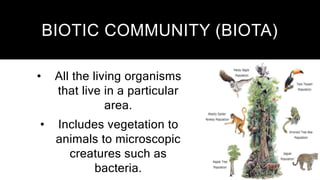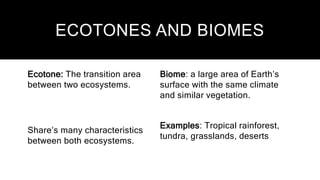Chapter 2 - The Environment and Organisms.pptx
- 1. CHAPTER 2: THE ENVIRONMENT AND ORGANISM REGIE L. MAGALLANES, LPT, M.ED Environmental Science - Instructor
- 2. ECOLOGY The study of the relations ships between organisms and between organisms and their environment.
- 3. WHAT DO YOU MEAN ENVIRONMENT? The environment is made up of two things 1. Abiotic Factors: Non-living (never was living) Examples: rocks, water, air, weather, sunlight, sand, and temperature. 2. Biotic Factors: Living ,once living things or part of a living organism. Examples: Leaves, trees, poop, whales, flowers, mushrooms.
- 4. ORGANISM • Any unicellular or multicellular form exhibiting all the characteristics of life, an individual • • The lowest level of organization in ecology
- 7. SPECIES • All the organisms of a single kind (plant, animal or microbe). • Organisms can and do mate and produce fertile offspring
- 11. POPULATION • A group of individuals of the same species that live in a given area and interbreed. Example: Wolves of Yellow Stone Park, The ants at AISE, Plumeria’s in Cairo.
- 12. POPULATION VS. SPECIES • Population vs. Species: Gray wolves of Yellowstone park vs. gray wolves of the world.
- 13. BIOTIC COMMUNITY (BIOTA) • All the living organisms that live in a particular area. • Includes vegetation to animals to microscopic creatures such as bacteria.
- 14. ECOSYSTEMS • An interactive complex of the communities and the abiotic environment affecting them within a particular area.
- 15. ECOTONES AND BIOMES Ecotone: The transition area between two ecosystems. Share’s many characteristics between both ecosystems. Biome: a large area of Earth’s surface with the same climate and similar vegetation. Examples: Tropical rainforest, tundra, grasslands, deserts
- 16. QUESTION? 1. Which Foci of ethics do you most agree with? 2. What counts as an ethical action, does it always agree with science / economy? 3. If not, then what weighs or decides which action to be taken?
- 17. THANK YOU!
















